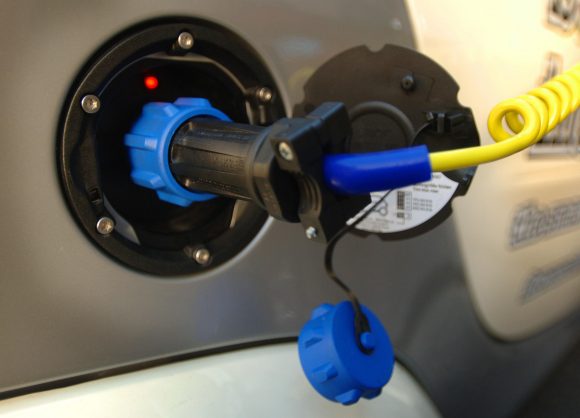Motor industry experts are urging Jeremy Hunt to use next Wednesday’s Budget to help the sector towards the 2030 ban on new petrol and diesel car and van sales.
Pressure is being put on the chancellor to align the VAT rate on public EV chargers with the domestic rate.
Innovations around tax measures to help with the export market would also help, they say.
Maria Bengtsson, electric vehicle lead at EY in the UK, said: ‘Continued and increased focus on charging infrastructure will be required.
‘While the government has previously announced several funds to support the roll-out of infrastructure, these have not yet had the intended effect on the pace of the roll-out.
‘Given ongoing infrastructure challenges, particularly in remote areas, and the significant reliance that EV charging infrastructure currently has on private investment, further commitment in this area could only be a positive for the automotive sector and its endeavours to help the UK reach its sustainability goals.
‘With a sharp focus on the UK’s EV transition, the chancellor could look to reduce the running costs for EVs by aligning the VAT rate on public EV chargers with the lower rate that applies to power from home chargers, as recommended by Chris Skidmore in the Net Zero review.’
David Borland, EY UK&I automotive leader, says the Budget measures could also be used to provide more support to automotive exports.
‘The importance of global trade in the UK’s automotive sector is undeniable.
‘According to SMMT data, around 80 per cent of cars made in the UK are exported, while around 90 per cent of the cars sold in the UK are imported,’ he said.
‘With this in mind, along with the recent effects of supply chain disruption and economic headwinds on the automotive sector, innovation around tax measures and how they could benefit the UK’s international automotive trade would undoubtedly be very welcome.’
Meanwhile, Lisa Watson, director of sales at Close Brothers Motor Finance, said: ‘The motor industry is unlikely to be at the top of the chancellor’s “to do” list, but it must at least be on the agenda.
‘The 2025 introduction of excise duty to electric cars in the Autumn Budget caught the industry by surprise.
‘Making consumers less likely to make the shift towards alternative fuel vehicles has made an already-challenging 2030 Net Zero target look distinctly at risk.’
She added: ‘The government must now reaffirm its commitment to its Net Zero ambitions with tangible policy change.
‘Investment in public charging infrastructure to keep up with the pace of electric vehicle adoption is critical. Focusing investment on the north and in rural areas would support the levelling-up agenda too.
‘VAT exemption for EV charging would help mitigate the impact of the rising cost of energy for those who have made the switch.
‘Measures like these would bolster a huge number of government ambitions and would give car dealers, manufacturers and drivers a much-needed jump-start on the road to recovery.’


































